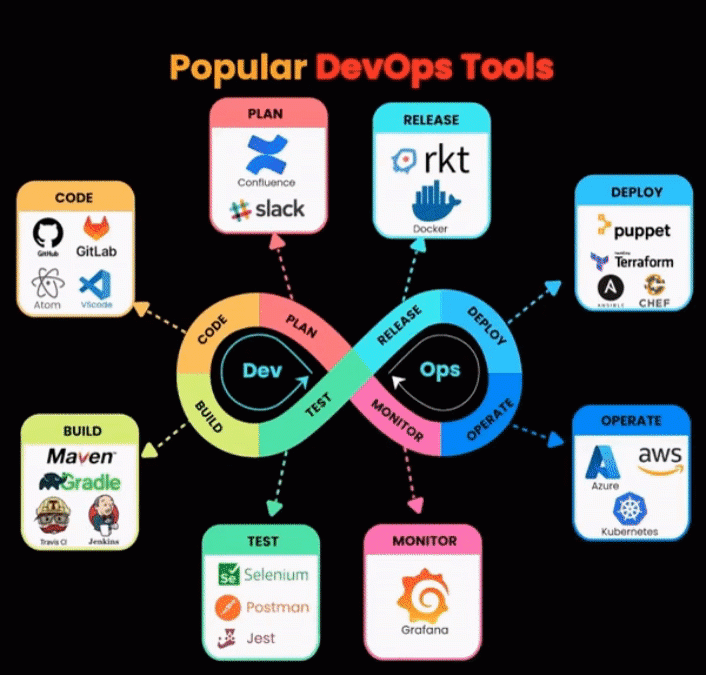Essential DevOps Tool Stack for 2024: Navigating the Evolving Landscape
The DevOps landscape is in a perpetual state of evolution, demanding agility, adaptability, and a keen eye on emerging technologies from modern developers. To stay ahead of the curve and ensure DevOps success, equipping oneself with the right tools is not just important but imperative. In this post, we’ll dissect the essential tool stack for DevOps success in 2024, covering various categories and highlighting key players within each.
Version Control: Ensuring Collaboration and Tracking
Git (GitHub, GitLab, Bitbucket)
Git remains the undisputed champion in the realm of version control systems. Empowering collaboration and providing robust version tracking capabilities, Git boasts an extensive ecosystem supported by platforms like GitHub, GitLab, and Bitbucket.
Mercurial
While Git dominates, Mercurial continues to hold relevance, particularly for distributed development and specific workflow requirements.
Infrastructure as Code (IaC): Streamlining Deployment and Management
Terraform
Terraform emerges as a cloud-agnostic and multi-cloud capable tool, defining infrastructure in human-readable code. Its flexibility and scalability make it a staple in modern DevOps workflows.
AWS Cloud Formation, Azure Resource Manager
For cloud-specific infrastructure provisioning and management, AWS CloudFormation and Azure Resource Manager offer deep integration within their respective platforms, catering to diverse cloud environments.
Configuration Management: Automating Complex Configurations
Ansible
Ansible, being agentless and automation-focused, simplifies complex configurations with YAML playbooks, offering a straightforward approach to managing infrastructure.
Chef
With strong enterprise support and utilizing Ruby DSL for configuration management, Chef stands as a mature tool capable of handling intricate configuration needs.
Continuous Integration/Continuous Deployment (CI/CD): Orchestrating Development Pipelines
Jenkins
Jenkins, an open-source and highly customizable CI/CD tool, provides developers with the flexibility needed for managing complex pipelines efficiently.
CircleCI, GitLab CI/CD
Cloud-based and user-friendly, CircleCI and GitLab CI/CD offer seamless integration with popular platforms, streamlining the CI/CD process.
Spinnaker
For organizations requiring multi-cloud and multi-platform support, Spinnaker emerges as a robust choice, facilitating complex deployments across diverse environments.
Containerization and Orchestration: Scaling Applications with Efficiency
Docker
Docker continues to set the standard for building and sharing portable container images, enabling developers to streamline application deployment across different environments.
Kubernetes
Kubernetes orchestrates containerized applications at scale, ensuring high availability, scalability, and efficient resource utilization.
Rancher, Docker Swarm
Alternative container orchestration platforms like Rancher and Docker Swarm cater to specific needs and preferences, offering flexibility in managing containerized environments.
Monitoring and Observability: Ensuring Performance and Stability
Prometheus & Grafana
Open-source powerhouses, Prometheus and Grafana, enable developers to collect and visualize metrics with high flexibility, facilitating effective monitoring and observability.
Datadog, New Relic
Commercial solutions like Datadog and New Relic offer comprehensive monitoring and application performance insights, empowering organizations with actionable data for optimization.
Sysdig Monitor, Azure Monitor
Cloud-specific monitoring options such as Sysdig Monitor and Azure Monitor provide deep integration and analysis capabilities, ensuring robust performance management in cloud environments.
Communication and Collaboration: Facilitating Team Dynamics
Slack, Microsoft Teams
Real-time communication platforms like Slack and Microsoft Teams foster efficient team collaboration, enabling seamless information exchange and collaboration across teams.
PagerDuty, Opsgenie
Incident management and alerting tools such as PagerDuty and Opsgenie ensure timely issue resolution and effective incident response, minimizing downtime and disruptions.
Security in Mind: Safeguarding Code and Infrastructure
SonarQube, Aqua Security
Secure code and infrastructure with tools like SonarQube and Aqua Security, which offer static and dynamic code analysis capabilities, ensuring robust security measures throughout the development lifecycle.
Twistlock, Prisma Cloud
Cloud-native security solutions like Twistlock and Prisma Cloud specialize in safeguarding containerized environments, offering comprehensive security features tailored to modern DevOps workflows.
Remembering the Essentials
- Flexibility and Adaptability: The best tools depend on your specific needs and environment.
- Continuous Learning: Stay updated with emerging tools and trends in the DevOps space.
- Specialization: Master a core set of tools, then specialize based on your projects and interests.
In conclusion, mastering the essential tool stack for DevOps success in 2024 requires a combination of adaptability, continuous learning, and strategic tool selection tailored to specific project requirements and organizational goals. By leveraging the right tools effectively, developers can navigate the evolving DevOps landscape with confidence and efficiency.
Keep visiting QuickShare and write to us in the comments below.

